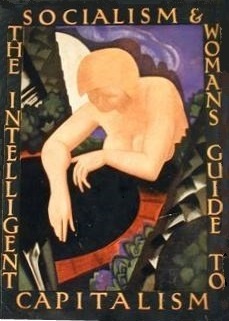 | |
| Author | George Bernard Shaw |
|---|---|
| Language | English |
| Genre | Non-fiction |
Publication date | 1928 |
The Intelligent Woman's Guide to Socialism and Capitalism is a non-fiction book written by the Irish playwright George Bernard Shaw. The book employs socialist and Marxist thought. It was written in 1928 after his sister-in-law, Mary Stewart Cholmondeley, asked him to write a pamphlet explaining socialism. [1] The book was later re-released as the first Pelican Book in 1937. The dust jacket artwork for the British and American first editions was by the British artist and sculptor Eric Kennington.
Contents
In the book, Shaw examines various socialist ideas, including the issue of private property under socialism, population control, the difficulty of creating non-market-based means to ascribe value to human activities and the problem of wealth distribution. He explores Marxist concepts such as surplus value along with the ideas of non-Marxist socialist thinkers such as Henry George. [2]